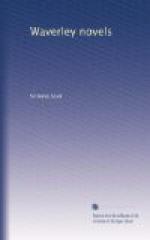The Highlanders next morning sought for their prisoners with great activity. An old gentleman told the author he remembered seeing the commandant Stewart
Bloody with spurring, fiery red with haste,
riding furiously through the country in quest of the fugitives.
Note 3, p. 28
To go out, or to have been out, in Scotland was a conventional phrase similar to that of the Irish respecting a man having been up, both having reference to an individual who had been engaged in insurrection. It was accounted ill-breeding in Scotland about forty years since to use the phrase rebellion or rebel, which might be interpreted by some of the parties present as a personal insult. It was also esteemed more polite, even for stanch Whigs, to denominate Charles Edward the Chevalier than to speak of him as the Pretender; and this kind of accommodating courtesy was usually observed in society where individuals of each party mixed on friendly terms.
Note 4, p. 38
The Jacobite sentiments were general among the western counties and in Wales. But although the great families of the Wynnes, the Wyndhams, and others had come under an actual obligation to join Prince Charles if he should land, they had done so under the express stipulation that he should be assisted by an auxiliary army of French, without which they foresaw the enterprise would be desperate. Wishing well to his cause, therefore, and watching an opportunity to join him, they did not, nevertheless, think themselves bound in honour to do so, as he was only supported by a body of wild mountaineers, speaking an uncouth dialect, and wearing a singular dress. The race up to Derby struck them with more dread than admiration. But it is difficult to say what the effect might have been had either the battle of Preston or Falkirk been fought and won during the advance into England.
Note 5, p. 43




